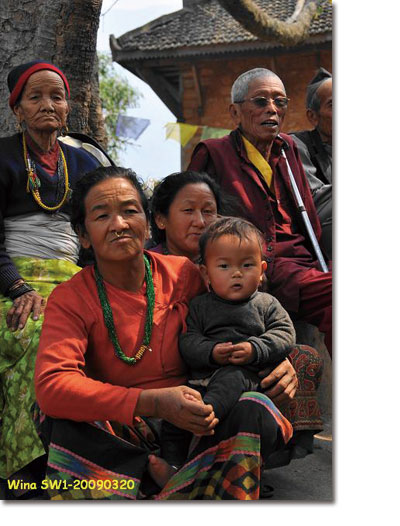アジア・アフリカ地域研究情報マガジン:メルマガ写真館
 |
|
Nepal, a country in the sky I was very happy when my application for Nepal field school accepted. So I can see and now Nepal directly. I went to Nepal with 12 students and 3 Professors from ASAFAS. In Nepal, we also accompanied by Nepal students and experts. We visit many places, go to national park, join local lectures, meet people and stay with the villagers in countryside. It is very good way to go to the field and study directly. It is something that we cannot get, by only sitting and listening the lectures in a class.
Nepal is one of dreamer destination, a country in Himalayans with exotic environment scenes and great cultures history. The. great Buddha, Sidharta Gautama was born in Lumbini, Nepal. But not all Nepal people are Buddhist; about 81% of Nepal people are Hindu. Nepal has multicultural and diverse ethnic groups, including Newar, Limbu, Rai, Thakalis and Tamang.
There are three main cultural zones in Nepal, Terai, middle hills and Himalayan zone. The political condition in Nepal is not stable, especially after the kingdom change to be a republic. And over 2.5 million from 29 .519,114 total population (2008) living in poverty. To get a better life, many Nepalis go abroad for working and sent more than US 650 million a year to their hometown. Pinthali Village During field school, we have chance to visit and stay in Pinthali Village in Mangaltar VDC, Kavre District, or about 2 hours by car from the capital city, Kathmandu. The village is in the mountain. They have no public transportation, so we have to walk up about 2 km from national highway. The children in the village spending 2 hours or more to go to school by walk. Although is not easy to reach that village, but the village is very beautiful. It is in the top of the mountain and surrounded by other high mountains and valleys. The villagers live next to their farming areas. They live by farming garlic, paddy, corn, barley,nuts and vegetables. The farming areas supported by micro hydro energy and irrigation
There are 129 households. All the villagers are Tamang people. Tamang is the largest ethnic group. Their culture has strong Tibetan influenced. Their ancestors were Tibetan army, horse traders and cavalrymen. There is only one elementary school in the village with less teacher and facilities. Women of Pinthali Village In the village, I and two other students stayed in a house owner by Ms. Gopini and her mom. Both of them live in 3-story house. They have 6 goats, hens, dogs and cow. Compare with other women in this village, Gopini is lucky. She has a chance to study until 12-grade (Senior High School) in Mangaltar and become a teacher for the 1 and 2 grade students in the only school in her village. Everyday, she has to spend her time to do both. She has a dream to be a good teacher, so se can teach the children and women in her village.
Most of the women in this village get married at young age, around 17 or under twenties. Only some of them has chance to go to school. Most of them uneducated, cannot read and write, and also not all of them can speak Nepal Language. They only know their own language, Tamang ethnic language.
One night, we have a chance to meet the women of this village. About 30 women are gathering together in a house of village women leader. They are very happy to meet us from Japan. They are very curious why we came to their village and what we can share with them to improve themselves. They also talk about their activities as a mother, wife and woman. I can feel their enthusiasm and spirit from their words and their faces.
Women in this village spending their time for taking care their families by doing housewives works and go to the farm from early morning, before the sunrises until late night. In other side, the men have lots free time, after doing the farm works, spending their time for chatting and drinking.
The women in the village want to change and improve themselves. For this reason, since several years ago, they established informal women activities group. The main activity of this group is to learn and share. The women of the village gathering in a place together and learn how to read and how to write. They also discuss about their matter. “I want to be a clever woman. So, I cannot be cheated by men!” said a woman during our meeting with them at nighttime. “I want to speak Nepali fluently, so I can understand the TV and radio program!” said others. “I just want to learn to be better!”
The have very high spirit and motivation to improve themselves. They want to be a good housewife and mother. So they can communicate with their children about school works. To improve their life, they allow their children to go to other place for education. They want their children can have chance to study until higher level, like us, the student from Kyoto University.
I learn lots during my 2 days stay in the village. Although they are only the housewives, I think, they are great women. They are not only live for themselves but also to make their family happy and have better life. I believe, since they are very optimist, in the next several years, the village women will improve themselves in education and knowledge.
Field school gives me a chance to know Nepal closer and better. Although it is very short time, I learn a lot. I take lot of pictures too, so I can share with other who never visit or already visit Nepal. I hope I could published it in a book, so people can see and know more about this country, a heaven in Himalayans.
|
| アジア・アフリカ地域研究マガジン第72号(2009年6月配信) |
